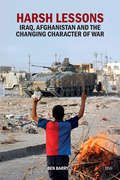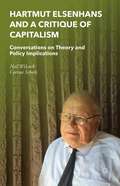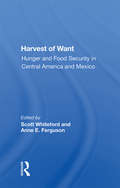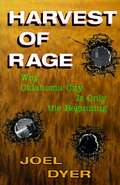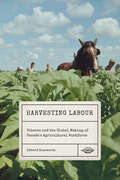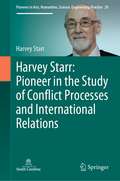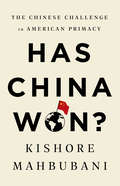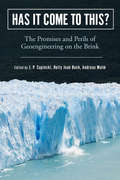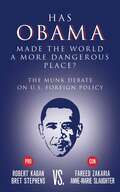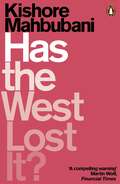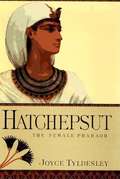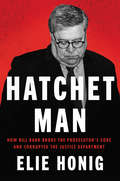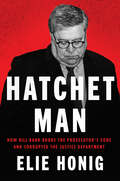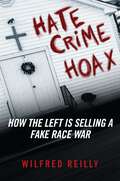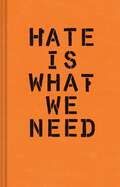- Table View
- List View
Harry: A Biography Of A Prince
by Angela LevinAn eye-opening, monumental biography of Prince Harry by a veteran journalist on royal affairs who accompanied the prince on his royal duties for a year and was granted privileged access to his home in Kensington Palace. Once a reckless rebel and now a respected role model, Prince Harry is one of the world's most popular royals and the force behind giving the British royal family a twenty-first century makeover. How has he done it? This insightful new biography is a three-dimensional look at what Harry is really like as a person, both on and off royal duty. It is written by distinguished journalist and author Angela Levin, who accompanied Prince Harry on many of his engagements and had exclusive access to him at Kensington Palace. The book unwraps the real man behind the camera, and his own perceptive insights. It delves into his troubled childhood and the lasting effect of losing his adored mother, Diana, Princess of Wales, so young. It explores his rebellious teenage years and the key defining moments that have enabled him to face his demons and use this experience to help others who struggle with mental, emotional and physical pain. Angela Levin found a complex man who has inherited his late mother's extraordinary charisma and is determined to "make a difference." After finding the love of his life in Meghan Markle, and in anticipation of their marriage this year, this is an investigation into the real life of Prince Harry.
Harry: Life, Loss, And Love
by Katie NichollOn the eve of his wedding comes the most intimate and informative portrait yet of Prince Harry, from royal expert Katie Nicholl, author of the bestselling William and Harry and Kate.From his earliest public appearances as a mischievous redheaded toddler, Prince Harry has captured the hearts of royal enthusiasts around the world. In Harry, Britain's leading expert on the young royals offers an in-depth look at the wayward prince turned national treasure. Nicholl sheds new light on growing up royal, Harry's relationship with his mother, his troubled youth and early adulthood, and how his military service in Afghanistan inspired him to create his legacy, the Invictus Games.Harry: Life, Loss, and Love features interviews with friends, those who have worked with the prince, and former Palace aides. Nicholl explores Harry's relationship with his family, in particular, the Queen, his father, stepmother, and brother, and reveals his secret "second family" in Botswana. She uncovers new information about his former girlfriends and chronicles his romance and engagement to American actress Meghan Markle.Harry is a compelling portrait of one of the most popular members of the royal family, and reveals the inside story of the most intriguing royal romance in a decade.
Harsh Lessons: Iraq, Afghanistan and the Changing Character of War (Adelphi Ser.)
by Ben BarryThe recent Afghanistan and Iraq wars were very controversial. The conflicts’ casualties, intractability and the apparent failure of the US and its allies to achieve their objectives mean that many see the wars as failures. This resulted in a loss of confidence in the West of the utility of force as an instrument of state power. Both wars have been well described by journalists. There is no shortage of memoirs. But there is little discussion of how the conduct of these wars and capabilities of the forces involved changed and evolved, and of the implications of these developments for future warfare. This book gives readers a clear understanding of the military character dynamics of both wars and how these changed between 2001 and 2014. This includes the strategy, operations, tactics and technology of the forces of the US and its allies, Afghan and Iraqi government forces as well as insurgents and militias, showing how they evolved over time. Many of these developments have wider relevance to future conflicts. The book identifies those that are of potential wider application to US, NATO and other western forces, to insurgents, as well as to forces of states that might choose to confront the west militarily.
Hartmut Elsenhans and a Critique of Capitalism: Conversations on Theory and Policy Implications
by Neil Wilcock Corina ScholzThis book presents a series of interviews with Hartmut Elsenhans on his wide-ranging theories and their policy implications. Serving as a compilation of his distilled thoughts, we discuss with him his unique world economic theory, his theorisation of social movements, his work on overcoming underdevelopment, and much more.
Harvard Envy
by Andrew S RosenHarvard Envy is a chapter excerpt from Change.edu coming out October 18, 2011.Exploring the limitations of the exclusive, tradition-bound world of higher education, innovator Andrew S. Rosen, chairman and CEO of Kaplan, Inc., delivers a vision for making a world-class college experience available to students of all backgrounds. Little is known about John Harvard, who bequeathed his books and £779 to a fledgling college on the Charles River in the 1630s, but the institution that bears his name has become the gold standard for universities worldwide. Tracing this fascinating history, and the history of American higher education overall, "Harvard Envy" raises important questions about the effect of super-elite campuses on America's educational landscape. Just as Congress hotly debated whether to approve land-grant colleges in the nineteenth century, opening the doors of higher education to farmers, we face a competitive new demand for a highly educated workforce. Yet many colleges continue to insist on limiting access, and many college applicants continue to believe that exclusive institutions deliver the highest quality. With an eye-opening examination of the U.S. News and World Report college rankings and other barometers, "Harvard Envy" takes an enlightened look at how universities allocate resources and talent. Offering an inspiring alternative to the Ivory Tower playbook, Andrew S. Rosen presents a bold, cost-effective new vision for a truly competitive higher education system that serves both individual and national interests.
Harvest Of Want: Hunger And Food Security In Central America And Mexico
by Scott Whiteford Anne E. FergusonHarvest of Want demonstrates how hunger and malnutrition can exist simultaneously with growth in agricultural production. It points out a series of factors that have generated food insecurity throughout much of Central America and Mexico. .
Harvest of Empire: A History of Latinos in America (Revised Edition)
by Juan GonzálezA sweeping history of the Latino experience in the United States- thoroughly revised and updated. The first new edition in ten years of this important study of Latinos in U. S. history, Harvest of Empire spans five centuries-from the first New World colonies to the first decade of the new millennium. Latinos are now the largest minority group in the United States, and their impact on American popular culture-from food to entertainment to literature-is greater than ever. Featuring family portraits of real- life immigrant Latino pioneers, as well as accounts of the events and conditions that compelled them to leave their homelands, Harvest of Empire is required reading for anyone wishing to understand the history and legacy of this increasingly influential group.
Harvest of Rage
by Joel DyerIn its September 1997 issue, Soldier of Fortune Magazine suggested reading "Harvest of Rage" might be an appropriate and timely wake-up call for the Clinton Administration. In this book, Rocky Mountain News editor Joel Dyer through interviews and seemingly well-documented research describes the antigovernment movement in America today. Dyer dispells the myth that antigovernment movement members are rabid beer-swilling Bubus, and ably places the development of the movement in perspective in terms of the Farm Crisis, Federal Reserve policy, and the increased domination of agriculture by the multinational agribusiness concerns. Though Dyer may have his own agenda, the book presents the reality of the antigovernment movement's actions as well as the forces operating on the people involved.
Harvest the Vote: How Democrats Can Win Again in Rural America
by Jane KleebFrom Democratic Party rising star Jane Kleeb, an urgent and stirring road map showing how the Democratic Party can, and should, engage rural AmericaThe Democratic Party has lost an entire generation of rural voters. By focusing the majority of their message and resources on urban and coastal voters, Democrats have sacrificed entire regions of the country where there is more common ground and shared values than what appears on the surface.In Harvest the Vote, Jane Kleeb, chair of Nebraska’s Democratic Party and founder of Bold Nebraska, brings us a lively and sweeping argument for why the Democrats shouldn’t turn away from rural America. As a party leader and longtime activist, Kleeb speaks from experience. She’s been fighting the national party for more resources and building a grassroots movement to flex the power of a voting bloc that has long been ignored and forgotten.Kleeb persuasively argues that the hottest issues of the day can be solved hand in hand with rural people. On climate change, Kleeb shows that the vast spaces of rural America can be used to enact clean energy innovations. And issues of eminent domain and corporate overreach will galvanize unlikely alliances of family farmers, ranchers, small business owners, progressives, and tribal leaders, much as they did when she helped fight the Keystone XL pipeline. The hot-button issues of guns and abortion that the Republican Party uses to wedge voters against one another can be bridged by putting a megaphone next to issues critical to rural communities.Written with a fiery voice and commonsense solutions, Harvest the Vote is both a call to action and a much-needed balm for a highly divided nation.
Harvesting Labour: Tobacco and the Global Making of Canada's Agricultural Workforce (Rethinking Canada in the World)
by Edward DunsworthIn recent decades an increasing share of Canada’s agricultural workforce has been made up of temporary foreign workers from the Global South. These labourers work difficult and dangerous jobs with limited legal protections and are effectively barred from permanent settlement in Canada.In Harvesting Labour Edward Dunsworth examines the history of farm work in one of Canada’s underrecognized but most important crop sectors – Ontario tobacco. Dunsworth takes aim at the idea that temporary foreign worker programs emerged in response to labour shortages or the unwillingness of Canadians to work in agriculture. To the contrary, Ontario’s tobacco sector was extremely popular with workers for much of the twentieth century, with high wages attracting a diverse workforce and enabling thousands to establish themselves as small farm owners. By the end of the century, however, the sector had become something entirely different: a handful of mega-farms relying on foreign guest workers to produce their crops. Taking readers from the leafy fields of Ontario’s tobacco belt to rural Jamaica, Barbados, and North Carolina and on to the halls of government, Dunsworth demonstrates how the ultimate transformation of tobacco – and Canadian agriculture writ large – was fundamentally a function of the capitalist restructuring of farming.Harvesting Labour brings together the fields of labour, migration, and business history to reinterpret the historical origins of contemporary Canadian agriculture and its workforce.
Harvesting State Support: Institutional Change and Local Agency in Japanese Agriculture (Japan and Global Society)
by Hanno JentzschAgriculture has been among the toughest political battlegrounds in postwar Japan and represents an ideal case study in institutional stability and change. Inefficient land use and a rapidly aging workforce have long been undermining the economic viability of the agricultural sector. Yet vested interests in the small-scale, part-time agricultural production structure have obstructed major reforms. Change has instead occurred in more subtle ways. Since the mid-1990s, a gradual reform process has dismantled some of the core pillars of the postwar agricultural support and protection regime. Harvesting State Support analyzes this process by shifting the analytical focus to the local level. Drawing on extensive qualitative field research, Hanno Jentzsch investigates how local actors, including farmers, local governments, and local agricultural cooperatives, have translated abstract policies into local practice. Showing how local variants are constructed through recombining national reforms with the local informal institutional environment, Harvesting State Support reveals new links between agricultural reform and other shifts in Japan’s political economy.
Harvey Starr: Pioneer in the Study of Conflict Processes and International Relations (Pioneers in Arts, Humanities, Science, Engineering, Practice #29)
by Harvey StarrThis book sets out, through Starr’s personal story, his interest in how the ideas of “intellectual trajectories” and “political memories” could be incorporated into intellectual autobiography, thus exploring how the personal lives of individual academics intersected with their professional interests. By following the development of his approach to research, interdisciplinarity, the logic of inquiry, and the opportunity and willingness framework scholars and researchers will see how his groundbreaking research in Conflict Processes and International Relations Theory developed and were interlinked (especially diffusion, geography and spatiality; the democratic peace and integration; decision making). In addition, graduate students and junior faculty should find useful hints about how to navigate their way through the complexities of becoming both a professional and successful academic and scholar.• This book provides the most complete treatment of the work and contributions of Harvey Starr, a former President of the International Studies Association. • Important for contemporary students of international relations, and their understanding of IR theory and methods.• Demonstrates an eclectic linking of theoretical, logical, and empirical approaches to the study of IR—providing a critical logic of inquiry to do research.• Provides insights and blueprints for how to develop interdisciplinary and multidisciplinary scholarship, highlighting geography and social-psychology.• Affords graduate students and recent Ph.D.s guidance in the development of research, becoming a professional, and the choices to be made in one’s academic career.
Has China Won?: The Chinese Challenge to American Primacy
by Kishore MahbubaniThe defining geopolitical contest of the twenty-first century is between China and the US. But is it avoidable? And if it happens, is the outcome already inevitable? China and America are world powers without serious rivals. They eye each other warily across the Pacific; they communicate poorly; there seems little natural empathy. A massive geopolitical contest has begun. America prizes freedom; China values freedom from chaos. America values strategic decisiveness; China values patience. America is becoming society of lasting inequality; China a meritocracy. America has abandoned multilateralism; China welcomes it. Kishore Mahbubani, a diplomat and scholar with unrivalled access to policymakers in Beijing and Washington, has written the definitive guide to the deep fault lines in the relationship, a clear-eyed assessment of the risk of any confrontation, and a bracingly honest appraisal of the strengths and weaknesses, and superpower eccentricities, of the US and China.
Has It Come to This?: The Promises and Perils of Geoengineering on the Brink (Nature, Society, and Culture)
by Christian Parenti Richard York Jennie C. Stephens David Tyfield Laurence L. Delina Tina Sikka Nils Markusson Duncan McLaren Wim Carton Lili Fuhr Mads Dahl Gjefsen Ina Möller Anne Pasek Linda Schneider Kevin Surprise Kyle Powys WhyteGeoengineering is the deliberate and large-scale intervention in the Earth's climate system in an attempt to mitigate the adverse effects of global warming. Now that climate emergency is upon us, claims that geoengineering is inevitable are rapidly proliferating. How did we get into this situation where the most extreme path now seems a plausible development? Is it an accurate representation of where we are at? Who is this “we” who is talking? What options make it onto the table? Which are left out? Whom does geoengineering serve? Why is the ensemble of projects that goes by that name so salient, even though the community of researchers and advocates is remarkably small? These are some of the questions that the thinkers contributing to this volume are exploring from perspectives ranging from sociology and geography to ethics and Indigenous studies. The editors set out this diverse collection of voices not as a monolithic, unified take on geoengineering, but as a place where creative thinkers, students, and interested environmental and social justice advocates can explore nuanced ideas in more than 240 characters.
Has Obama Made the World a More Dangerous Place?: The Munk Debate on America Foreign Policy (Munk Debates)
by Robert Kagan Fareed Zakaria Anne-Marie Slaughter Bret StephensThe fourteenth semi-annual Munk Debate, which will be held in Toronto on November 5, 2014, pits Bret Stephens and Robert Kagan against Fareed Zakaria and Anne-Marie Slaughter to debate the legacy of President Obama.From Ukraine to the Middle East to China, the United States is redefining its role in international affairs. Alliance building, public diplomacy, and eschewing traditional warfare in favour of the focused use of hard power such as drones and special forces are all hallmarks of the so-called Obama Doctrine. Is this a farsighted foreign policy for the United States and the world in the twenty-first century — one that acknowledges and embraces the increasing diffusion of power among states and non-state actors? Or, is an America “leading from behind” a boon for the nations and blocs who want to roll back economic globalization, international law, and the spread of democracy and human rights?In this edition of the Munk Debates, Pulitzer Prize–winning journalist Bret Stephens and famed historian and foreign policy commentator Robert Kagan square off against CNN’s Fareed Zakaria and noted academic and political commentator Anne-Marie Slaughter to debate the legacy of President Obama. With ISIS looking to reshape the Middle East, Russia increasingly at odds with the rest of the West, and the Israeli-Palestinian conflict at a standstill, the Munk Debate on Foreign Policy asks: Has Obama’s foreign policy taken the U.S. in the right direction?
Has the European Experiment Failed?: The Munk Debate on Europe (The Munk Debates)
by Niall Ferguson Josef Joffe Peter Mandelson Daniel Cohn-BenditIn the sweep of human history, the European Union stands out as one of humankind's most ambitious endeavours. It encompasses half a billion people, twenty-seven member states, twenty-three languages, and an economy valued at over $15 trillion. Modern Europe's stunning achievements aside, its sovereign debt crisis has shaken the world's largest political and economic union to its core. Can the federal institutions and shared values of Europeans meet the challenges of debt crisis that are as much political as economic? Or, are Europe's current woes indicative of a series of deep structural faults that foreshadow the breakup and failure of the European Union? In this edition of the Munk Debates -- Canada's premier international debate series -- former EU Commissioner Lord Peter Mandelson and EU parliament co-president of the Greens/European Free Alliance Group Daniel Cohn-Bendit, German publisher-editor and author Josef Joffe, and renowned economic historian Niall Ferguson debate the future of the EU -- one of the most pressing global issues of our day. For the first time ever, this electrifying debate, which played to a sold-out audience, is now available in print, along with candid interviews with Niall Ferguson and Lord Peter Mandelson. As youth unemployment rates flare, currencies collapse, and political alliances erode, the Munk Debate on Europe tries to answer: Has the great European experiment failed?
Has the West Lost It?: A Provocation
by Kishore MahbubaniThe West's two-century epoch as global powerhouse is at an end. A new world order, with China and India as the strongest economies, dawns. How will the West react to its new status of superpower in decline? In Kishore Mahbubani's timely polemic, he argues passionately that the West can no longer presume to impose its ideology on the world, and crucially, that it must stop seeking to intervene, politically and militarily, in the affairs of other nations. He examines the West's greatest follies of recent times: the humiliation of Russia at the end of the Cold War, which led to the rise of Putin, and the invasion of Iraq after 9/11, which destabilised the Middle East. Yet, he argues, essential to future world peace are the Western constructs of democracy and reason, which it must continue to promote, by diplomacy rather than force, via multilateral institutions of global governance such as the UN. Only by recognising its changing status, and seeking to influence rather than dominate, he warns, can the West continue to play a key geopolitical role.'Kishore Mahbubani might well be the most intelligent, friendly and doggedly persistent critic of the West. In this brief book, he delivers some of his trademark analysis and pungent observations. We should all think of it as the cold shower that is urgently needed to revive the West' Fareed Zakaria, author of The Post-American World'A powerful, disputatious book. It's not comfortable reading, and it wasn't meant to be' Paul Kennedy, Director of International Security Studies and Professor of History at Yale University
Hashtag Activism and Women’s Rights: Are Social Media Campaigns Really Making Laws Better for Women and Girls?
by Reilly Anne Dempsey WillisWith over five billion internet users globally, it is crucial to understand social media activism and legal change for women and girls. This insightful book examines the impact of international Twitter (now X) campaigns on domestic laws affecting women and girls. Exploring the complexities of legal change for women and girls across seven countries from Latin America to Middle East and Africa, the book offers empirical insights into the effectiveness of hashtag advocacy and sheds light on the role of social media in shaping different outcomes. This is a key resource for understanding the dynamics driving social media activism and its potential impact on the rights of women and girls worldwide.
Hasta el cuello: Un thriller político situado en América del Sur
by Michael SegedyCuando Steve Collins, un periodista expatriado y desilusionado, viaja para cubrir un accidente de avión en medio de la selva amazónica, no sospecha de qué manera esta asignación va a cambiar su vida. Presionado por su editor, Steve acepta que se sume Jennifer Strand, una joven periodista adscrita a la Embajada de los EE. UU., sumamente bella y llena de valor. Ella lo acompañará en una aventura en la cual él descubrirá una verdad desconcertante sobre la política exterior estadounidense, y también sobre seguir ciegamente los dictados del corazón. Hasta el cuello es el primero de los dos libros que componen la galardonada serie Evil's Root.
Hatchepsut: The Female Pharaoh
by Joyce TyldesleyQueen - or, as she would prefer to be remembered King - Hatchepsut was an astonishing woman. Brilliantly defying tradition she became the female embodiment of a male role, dressing in men's clothes and even wearing a false beard. Forgotten until Egptologists deciphered hieroglyphics in the 1820's, she has since been subject to intense speculation about her actions and motivations. Combining archaeological and historical evidence from a wide range of sources, Joyce Tyldesley's dazzling piece of detection strips away the myths and misconceptions and finally restores the female pharaoh to her rightful place.
Hatchet Man: How Bill Barr Broke the Prosecutor's Code and Corrupted the Justice Department
by Elie HonigCNN Senior Legal Analyst Elie Honig exposes William Barr as the most corrupt attorney general in modern U.S. history, with stunning new scandals bubbling to the surface even after Barr's departure from office. In Hatchet Man, former federal prosecutor Elie Honig uncovers Barr’s unprecedented abuse of power as Attorney General and the lasting structural damage done to the Justice Department. Honig uses his own experience as a prosecutor at DOJ to show how, as America’s top law enforcement official, Barr repeatedly violated the Department’s written rules, and those vital, unwritten norms and principles that comprise the “prosecutor’s code.”Barr was corrupt from the beginning. His first act as AG was to distort the findings of Special Counsel Robert Mueller, earning a public rebuke for his dishonesty from Mueller himself and, later, from a federal judge. Then, Barr tried to manipulate the law to squash a whistleblower’s complaint about Trump’s dealings with Ukraine—the report that eventually led to Trump’s first impeachment. Barr later intervened in an unprecedented manner to undermine his own DOJ prosecutors on the cases of Michael Flynn and Roger Stone, both political allies of the President. And then Barr fired the U.S. Attorney for the Southern District of New York under false pretenses. Finally, Barr amplified baseless theories about massive mail-in ballot fraud, pouring gasoline on the dumpster fire battle over the 2020 election results and contributing to the January 6 insurrection that led to Trump’s second impeachment.In Hatchet Man, Honig proves that Barr trampled the two core virtues that have long defined the department and its mission: credibility and independence – ultimately in service of his own deeply-rooted, extremist legal and personal beliefs. Honig shows how Barr corrupted the Justice Department and explains what we must do to prevent this from ever happening again.
Hatchet Man: How Bill Barr Broke the Prosecutor's Code and Corrupted the Justice Department
by Elie HonigThis national bestselling account of Bill Barr’s tenure as Trump’s attorney general is “essential reading for all who cherish the rule of law in America” (George Conway).“Written with all the color and pacing of a legal thriller” (Variety), this book by a former federal prosecutor and CNN senior legal analyst exposes William Barr as the most corrupt attorney general in modern U.S. history. Elie Honig draws on his own experience as a prosecutor at DOJ to show how, as America’s top law enforcement official, Barr repeatedly violated the Department’s written rules, and those vital, unwritten norms and principles that comprise the “prosecutor’s code,” resulting in an unprecedented abuse of power. Barr, he states, was corrupt from the beginning: His first act as AG was to distort the findings of Special Counsel Robert Mueller, earning a public rebuke for his dishonesty from Mueller himself and, later, from a federal judge. Then, Barr tried to manipulate the law to squash a whistleblower’s complaint about Trump’s dealings with Ukraine—the report that eventually led to Trump’s first impeachment. He later intervened to undermine his own DOJ prosecutors on the cases of Trump allies Michael Flynn and Roger Stone, and fired the U.S. Attorney for the Southern District of New York under false pretenses. Finally, Barr amplified baseless theories about massive mail-in ballot fraud, pouring gasoline on the dumpster fire battle over the 2020 election results and contributing to the January 6 insurrection that led to Trump’s second impeachment.In Hatchet Man, Honig proves that Barr trampled the two core virtues that have long defined the DOJ and its mission: credibility and independence—and explains what we must do to prevent this from ever happening again.“Indicts Barr for treating his role as that of a personal enforcer for the president rather than the leader of an independent Justice Department . . . for readers looking for an accessible overview of Barr’s time as attorney general—or dizzied by the sheer volume of scandals that took place during the Trump presidency—Honig provides a useful rundown.” —The Washington Post“A comprehensive indictment of one of the most controversial figures of the Trump administration.” —Publishers Weekly“A resounding excoriation of an unquestionably corrupt operator.” —Kirkus Reviews
Hate Crime (Ben Kincaid #13)
by William BernhardtBestselling author William Bernhardt is an unsurpassed master at blending psychological suspense with gripping, surprise-filled legal action. Now, Bernhardt and his crusading attorney Ben Kincaid return in a thrilling story of love, hate, and the power of a courtroom to separate deception from the truth.In Tulsa, Ben Kincaid has built a national reputation as a stalwart defense attorney who will fight tirelessly for his clients. In Evanston, Illinois, Johnny Christensen has built a national reputation as a sadistic bigot who beat and stabbed a gay man and left him to die. When Johnny’s mother comes to Ben and begs him to defend her son, he has one secret reason for saying no.But while Ben turns down the case, his younger, beautiful partner, Christina McCall, does not. Traveling to Chicago and facing an explosion of controversy and deadly violence surrounding the trial, Christina steps into a case that is already nearly lost. Her client’s only defense is his claim that he left his victim bludgeoned but alive. To prove that someone else committed the actual murder, Christina needs a little bit of evidence—and a good motive to go with it.When unforeseen circumstances force Ben Kincaid to enter the trial, the defense attorney sees only one way to prove Johnny’s innocence. But Ben’s plan means luring a killer out of the woodwork—even though he may kill again. . . .A novel of gut-wrenching twists and surprises, this thriller brilliantly explores the passions between lovers—and the passions behind society’s most heinous crimes. Once again, the remarkable William Bernhardt makes us challenge every assumption, second-guess every judgment, and feel the terror of the truth.
Hate Crime Hoax: How the Left is Selling a Fake Race War
by Wilfred ReillyIf you believe the news, today's America is plagued by an epidemic of violent hate crimes. But is that really true? In Hoax, Professor Wilfred Reilly examines over one hundred widely publicized incidents of so-called hate crimes that never actually happened. With a critical eye and attention to detail, Reilly debunks these fabricated incidents—many of them alleged to have happened on college campuses—and explores why so many Americans are driven to fake hate crimes. We're not experiencing an epidemic of hate crimes, Reilly concludes—but we might be experiencing an unprecedented epidemic of hate crime hoaxes.
Hate Is What We Need
by Ward SchumakerThis state of the union is not normal.In this clothbound, hardcover volume, acclaimed artist Ward Schumaker transforms the egregious utterances of the 45th president of the United States of America into provocative text-based paintings. Translating the politics of our moment into visceral works of art, Schumaker offers an alternative to the desensitizing barrage of the news media. Refusing to sanitize or explain these statements, he intuitively features our collective dismay, confusion, and outrage at the stream of vitriol and contempt currently emanating from the White House.


